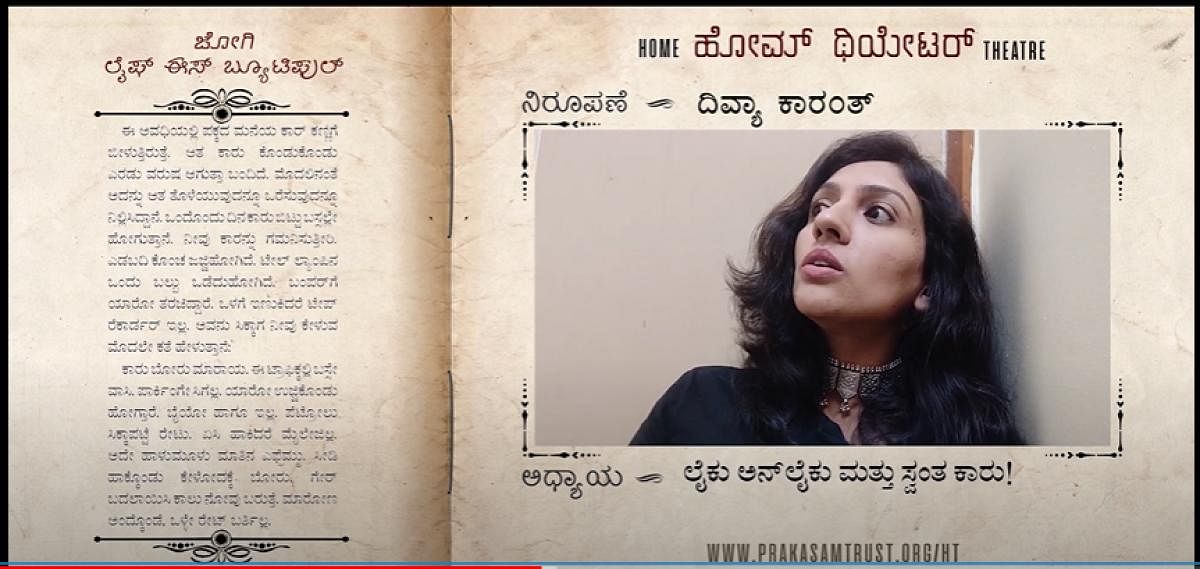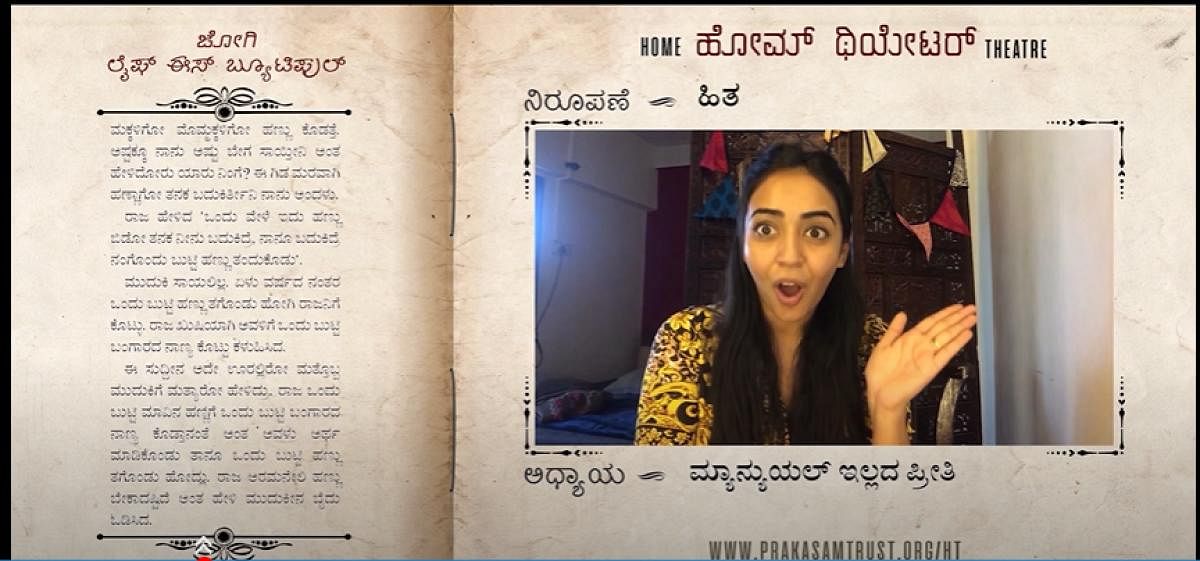

The pandemic has transformed the manner in which regional theatre and literature groups function, with many of them taking their activities online. Plays are increasingly being staged on virtual platforms and video books rule the roost.
P D Sathish Chandra, of the theatre group ‘Prakasam’ says that going virtual has been a boon of sorts for Kannada theatre.
Prakasam had to cancel four sure-hit fundraising shows when the pandemic made a ‘dramatic’ entry in March this year. “We staged a stand-up comedy by Sihi-Kahi Chandru called ‘Keetle’ online and the ticketed show was a hit,” he recalls.
“Theatre is a one-on-one interaction, unlike cinema. We leveraged social media platforms like Zoom, launched our shows on YouTube and learnt ways to collaborate. We also podcast online plays and video book reading done by celebs. We also held zero budget workshops on YouTube, Instagram, Facebook and Twitter,” he says.
“Other than physically meeting the audience, interacting with
them and having a good time, we don’t miss much,” he adds nonchalantly.
The Vijayanagara Bimba Centre for Theatre Education which recently turned 25, has a similar success story to share. The centre offers workshops — a one-year diploma course for adults and a six-month course for children. “When the lockdown was announced we were clueless about the next steps because admissions were over,” says Dr Sushma B V, the principal of the centre.
“Change was inevitable, and we went online with a poetry workshop presided by H S Venkatesh Murthy, summer course rehearsals, Chitrakathana (story boarding) and Bombe Habba for children and a couple of major productions for adults,” she says.
Except for practical subjects like make-up, prop-making, and lighting, Bimba migrated all other activities like script reading and theory subjects to virtual platforms and staged two-to-three-character classroom-produced plays by taking the necessary measures to avoid infection.
New forms
Murali Mohan Kati anchors a Zoom program called ‘Baduku Cinema Samvada’ where Kannada cinema directors share their experience with wannabe directors of marginalised communities and college youth.
“Baduku’s primary goal is to train people in film production and direction. During Covid-19 ‘Baduku Samvada’, which is 35-years old, was recreated in a new avatar on a social medium where screenwriting and direction lessons were shared with those exploring a career in filmmaking,” he says.
Among others, B Suresh, Champa Shetty, Roopa Rao, B M Giriraj, Jayathirtha, T K Dayananda, Chaitanya, Kabaddi Narendra Babu, and film critic N S Shankar were resource people in the series. “When the series was launched, many were hesitant to join in on Zoom. We had to hand-hold them through the process,” Kati recollects.
Dr Kumaraswamy Bejjihalli, the Head of the Kannada Department at Bengaluru’s Loyola college has launched a virtual interaction program for the benefit of Kannada research scholars in association with Dr Ravishankar A K.
Guided by eminent writers like Dr Rehamat Tarikere, he has set up a forum where Kannada research scholars can interact when they cannot physically meet their guides. “Saturday Samshodana Kannada Vedike podcasts have been attended by people from even Mumbai Hyderabad, Muscat and the USA,” he says.
Kumaraswamy says that there has been an instance wherein the podcast was attended by 37,000 people on Zoom from all over the globe. These programs were viewed by 6,000 people on Facebook too.
Researcher Arun Joladakudligi has launched an online forum for those interested in B R Ambedkar’s writing and speeches.
“I noticed that there were very few Kannada posts on YouTube on Ambedkar’s writings and speeches. So, I created an online platform where such posts can be shared. I invited people to make 10-to-30-minute audio posts on Ambedkar’s writings and speeches and send them to me,” he says.
Arun has uploaded 87 episodes onto YouTube so far. He has also collated content from activists, intellectuals, writers, professors, and journalists.
Post-Covid-19, Satish Chandra says that their plays will vastly go back offline except for promotions and trailers. Kumaraswamy and Murali Kati say that they will chug along with a ‘hybrid’ online-offline model where their offline programs are podcast simultaneously on YouTube and Zoom. As for Vijayanagara Bimba, they are already adopting the hybrid model where course theory is taught online and practicals are being conducted at the centre with the essential precautions.